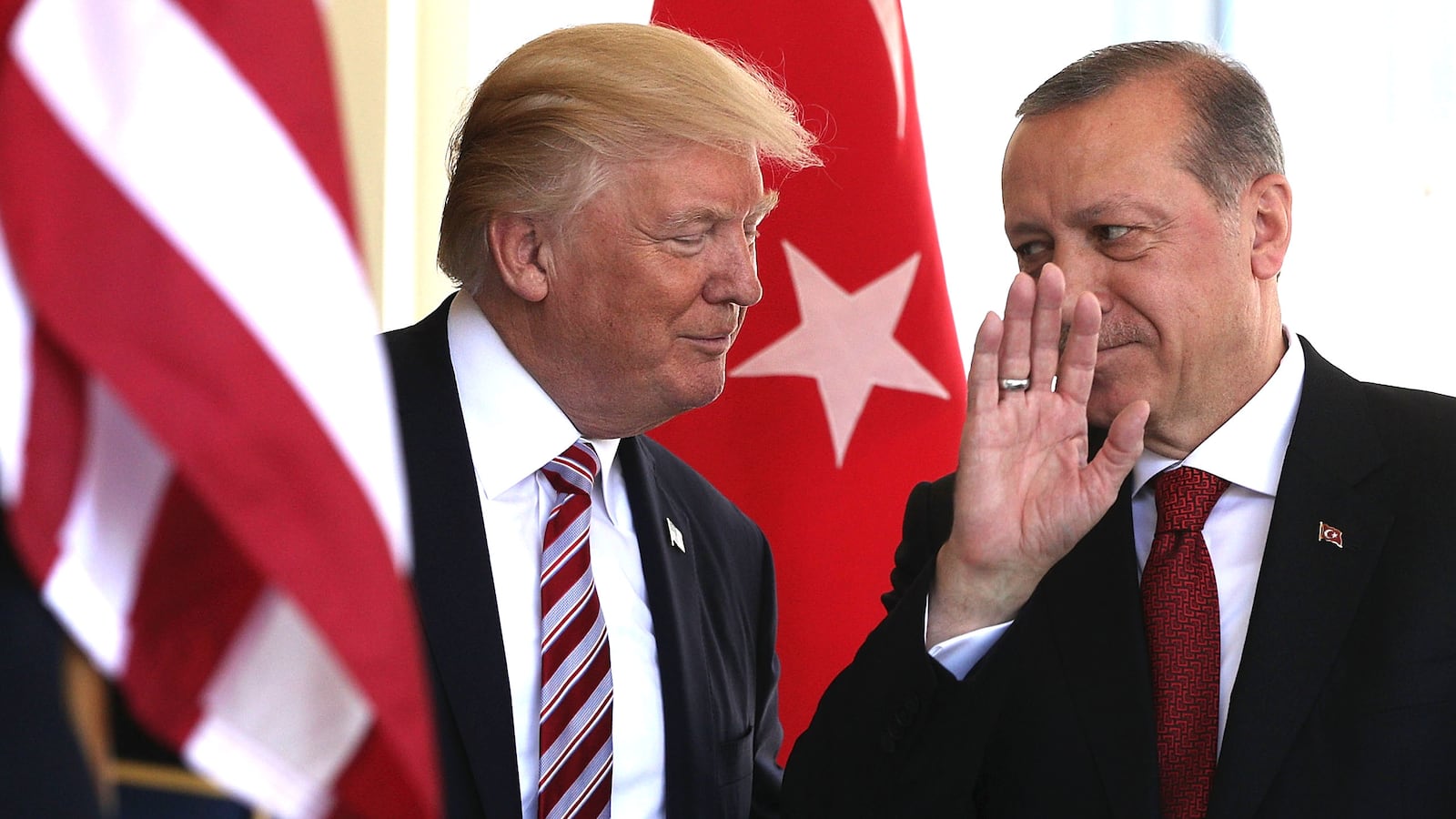ERBIL, Iraq—After U.S. President Donald Trump and his Turkish counterpart, Recep Tayyip Erdogan, talked on the phone last Friday, Erdogan’s foreign minister announced the Americans would no longer be providing weapons to the Kurdish People’s Protection Units (YPG).
The statement immediately led to speculation that the most effective fighters the U.S. has backed on the ground in Syria would be abandoned now that the the so-called Islamic State has been driven from Raqqa and other urban centers. The United States, after all, has a long record supporting proxies in guerrilla wars, then abandoning them once the fighting winds down, and nobody knows that better than the Kurds.
But this time, maybe the betrayal isn’t quite what it seems.
“Erdogan is always saying something on behalf of others, and the next day the same leaders deny what Erdogan said,” Ehmed Dadeli, a Kurdish military officer in Syria who works closely with the U.S.-led coalition forces, told The Daily Beast. “The U.S. states that the [largely Kurdish] Syrian Democratic Forces ‘are our partner,’ and this assists us and promotes us internationally,” he added.
A subsequent readout from the White House said that “consistent with our previous policy, President Trump also informed President Erdogan of pending adjustments to the military support provided to our partners on the ground in Syria, now that the battle of Raqqa is complete and we are progressing into a stabilization phase to ensure that ISIS cannot return.”
“The ‘adjustment’ of military support is true, but the support will not be stopped,” Dadeli said confidently.
Turkish officials aren’t giving up, however. They clearly want Washington to drop its support for the YPG and the SDF completely.
"Our friend and ally [the U.S.] told us every time that it was not an option, but rather an obligation,” to support the Kurds in the fight against ISIS, Turkish Prime Minister Binali Yıldırım said on Sunday. “Since Daesh [ISIS] is now eliminated, then this obligation has disappeared."
Turkish officials claim that there is no difference between the YPG and the Kurdistan Workers Party (PKK), which is designated as a terrorist group in the United States and Turkey, but Kurdish officials—and U.S. officials—deny links between the YPG and the PKK. Since 2015, the US has been backing the multi-ethnic alliance of Syrian Democratic Forces (SDF), which includes both Kurds and Arabs.
Aaron Stein, a fellow at the Atlantic Council in Washington, says for now the partnership stays. “The fight has wound down a bit, but those troops are still there,” he added. “Trump has signaled that he will stop the direct provision of weapons to the YPG, which suggests a reversion back to the pre-May 2017 status quo, where U.S. forces are on the ground and aircraft engaged in the fight, but no support is given to the YPG and SDF militia,” he concluded.
Coalition officials underline that this support for the SDF partner forces will continue for "stabilization" after ISIS. Several coalition partners such as Germany, France, and the U.K. meanwhile have promised several million dollars in support for this stabilization in Raqqa, which includes restoring services and demining, but not full reconstruction.
“The Coalition is committed to the military defeat of ISIS in Syria and to ensure they cannot return to liberated areas,” Coalition spokesperson Colonel Ryan Dillon told The Daily Beast.“We will continue our partnership with the Syrian Democratic Forces to complete the liberation of the remaining ISIS-held areas, and we will also support security operations that enable stabilization in these areas.”
“The 70 nations and four non-state organizations which comprise the Coalition remain committed to providing the support, advice and assistance to our partner forces in Syria to ensure ISIS' enduring defeat,” Dillon added, citing a statement by U.S. Secretary of Defense James Mattis: “We will stand by the SDF through the Geneva process.”
The Geneva process is predicated on the idea that forces on the ground opposed to Syrian President Bashar al Assad are strong enough to get concessions leading eventually to free elections and the dictator’s removal.
Another U.S. official told The Daily Beast on condition of anonymity that the US-led coalition equips the SDF as needed for specific missions such as in Raqqa. “That has always been the case since the earliest operations. President Trump authorized the equipping of the Kurdish elements of the SDF for the Raqqa campaign. We have been 100 percent transparent with Turkey throughout in terms of what we have provided and when,” the official added.
“The Raqqa battle is now over, so it makes sense that we would adjust our support to the SDF accordingly, given that they are now increasingly focused on holding liberated terrain versus taking new terrain,” the U.S. official said. “We’ve always told the Turks that our partnership with the SDF is tactical and in the service of defeating ISIS. We are there to help the SDF defeat ISIS, and ISIS is not yet defeated, so we’re going to keep doing that,” the official said.
According to Jonathan Spyer, Director of the Rubin Center in Israel, there might be a difference in the policy ideas of the U.S. State Department and the Pentagon about staying in northern Syria.“The interpretation that Trump's statement presages a U.S. exit from eastern Syria and abandonment of the alliance is I think premature,” Spyer said. "I think Mattis and the DOD want to stay, but [Anti-ISIS special envoy Brett] McGurk wants to go, so the Americans are confused and rudderless, but the Mattis line has a chance of winning, and may well do so."
Ilham Ahmed, the influential co-president of the Democratic Council of Syria, a mostly Kurdish-led organization associated with the SDF, has held several meetings with U.S. officials both in Syria and in Washington. She told The Daily Beast that the U.S. needs to continue to support the SDF.
“There's a difference in the statements of Ankara and the White House. I hope [a cutoff] is not true because that means it’s opening a new path for ISIS to appear again, and that's what Ankara is seeking, to spread chaos all over Syria,” she said.
Alan Semo, a representative of the Kurdish Democratic Union Party (PYD), also doubts the U.S. will drop it’s support, and suggests Ankara is lying.“We believe that U.S. can't afford to cease its support to the Kurds as that would have considerable implications and consequences on U.S. itself, to lose 30 percent of the territory under its control, which potentially would go to Russia.”
“It would undermine the fight against ISIS terror and stability of areas liberated from from ISIS and leave the Kurds vulnerable to attacks by regional powers,” he said, but added, “Whatever happens, Syrian Kurds are self-reliantly capable to defend themselves and protect their position.”
A Syrian humanitarian worker who operates closely with Americans for the return of services, electricity and water to Raqqa, also doubts the US will leave soon. “The U.S. is not here to leave, they are here to stay,” he said. “If the YPG is defeated, what is the alternative, the regime? ... The U.S. will have no more leverage,” the Syrian said.
“The U.S. policy is to pretend to not have a policy in order to avoid direct conflict with indispensable allies and partners.” Farhad Patiev, a representative of the Syrian Kurds in Moscow, also doubts that the U.S. will stop supporting the SDF. “But in the case the U.S. withdraws support from the SDF, a dangerous scenario will happen,” he said. “That would mean the project for a Democratic Federation in Northern Syria would be toppled.”
“If the U.S. withdraws from this region, it means the Syrian regime will take over. And once the Syrian regime takes over, it means there will be no more trust in America in the whole region,” he said. Washington-based analyst Nicholas Heras, a fellow at the Center for a New American Security agrees that dropping support for the SDF is not on the table for the foreseeable future. “The SDF is too important to the U.S. mission of building stability in Syria after ISIS,” he said.






